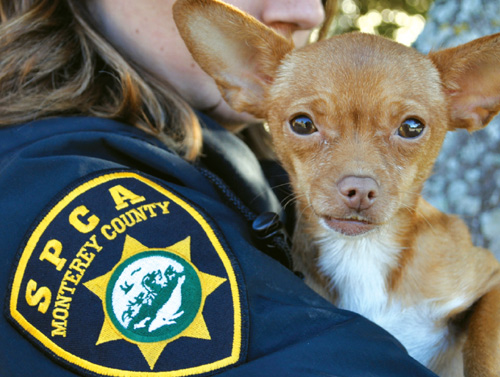
In her search for a dog that would make a good running and biking companion, Stephanie Oh spent six months visiting animal shelters. The San Jose resident competes in off road marathons, so she wanted an athletic breed that would be big enough to play, but not too big to handle. Oh was ready to give up when she came to the Monterey Peninsula for a cycling event and, on a whim, stopped by the SPCA for Monterey County.
There, she met Sammy.
“It was one of those ‘love at first sight’ moments,” Oh remembers. “He was just sitting quietly in his cage when all the other dogs around him were barking, pacing, jumping. He looked kind of shy. I just knew that was my dog.”
She took the Siberian Husky-Rottweiler mix for a walk and quickly noticed a timid streak that tempered his playfulness. “It was sad to see a dog that was so happy to be out and playing one minute, and so extremely terrified the next,” says Oh. An SPCA staff member explained that Sammy had been rescued from his original owner, after that owner clipped the dog’s ears and tail and withheld food and water in an attempt to make him more aggressive.
Sammy was seized and underwent surgery. Today, two years after Oh adopted him, he is an active, happy three-year-old. “We’ve gone up and down the coast to Canada and back twice now. We go to Tahoe a lot. We’ve been backpacking in the Mojave Desert. We hang out at friends’ houses. Anywhere I could possibly take him, he goes,” Oh says.
Sammy’s adoption is one of many success stories from the Monterey County SPCA’s Humane Investigations program. Department officers respond to approximately 1,000 reports annually, looking into issues related to food, water and care deprivation, dog fighting, maiming, abandonment and other cases of animal neglect and cruelty.
“Concerned parties can call us or file an online complaint,” says Captain Judi Adams, SPCA humane investigations supervisor, “but we do stress that all calls are anonymous. We keep everyone confidential.” When a call comes in, an SPCA officer visits the reported home to assess the situation. If an animal simply needs veterinary care or improvements to a living situation, the officer walks owners through the process and allots time for compliance.
Many calls uncover unintentional neglect and end with fairly straightforward fixes, such as installing a running line for chained dogs or improving food and water access. In those cases, the goal is education. “We want to give owners the tools and knowledge to give animals a better life. We don’t want to have to take animals away,” Adams says. For more serious incidents of starvation or abuse, or if owners do not comply with recommendations, the SPCA has the power to seize animals.
Two humane investigation employees are sworn humane officers, which means they completed training that allows them to exercise the powers of a peace officer while investigating crimes involving animals. In extreme cases, the district attorney’s office steps in to prosecute and the SPCA holds animals in protective custody. Seized and surrendered animals receive the care they need and the SPCA then typically works to find an adoptive family–whether the rescued party is a dog, bird, horse or other species.
“Our purpose is to do the right thing and get an animal out of a bad situation if it needs it,”Adams says. “But we really do hope we can teach people what they need to do, so that they can make changes without us having to take their animals.”
The public plays a crucial role in protecting pets, she explains. Just knowing the laws can help concerned parties decide when to file a report.
“The laws are pretty basic. Animals need fresh water all the time and an adequate food supply on a regular basis. If an animal is hurt or injured or sick, it needs to be taken to a vet,” says Adams. “By California law, dogs tied up for more than three hours a day must be on a trolley or running line, as well.”
Other signs of trouble include dangerously thin animals or those that look or sound distressed. For basic barking and crying complaints, as well as licensing issues, members of the public should call animal control. If a problem seems more serious, however, the SPCA can provide guidance. “We would much rather go out and find that something has no merit than to have an animal suffer because it wasn’t reported,”Adams says. In addition to improving animals’ lives, Adams says she and her fellow officers appreciate the opportunity to inspire long-term change.
“If you come from a family that’s always had a dog staked in the back yard, you might grow up and do that same thing,” she says.”But, if kids learn early that it’s really not the best way—it’s not good for the dog, the dog doesn’t get socialized and it could become aggressive—then maybe when they grow up and have their own pets, they’ll do things more humanely.”
Happily, proper care can change the lives of animals that have been abused, and those pets are often the ones who bond most closely with their new owners.
“It’s sad that there are dogs that don’t have homes to go to,” Oh says. “There’s no need to go to any other place than a shelter to get a dog, because there are so many good, quality, loving dogs. Even if they have had traumatic backgrounds, like Sammy, they can quickly bounce back to be happy and well-balanced.”
If you suspect that an animal is being mistreated or neglected, call the SPCA Humane Investigations Department at 831/373-2631 or submit a report online at www.spcamc.org. All reports are kept confidential. SPCA for Monterey County is an independent agency not supported by a national parent organization or outside funding. To volunteer or make a financial donation, visit www.spcamc.org.